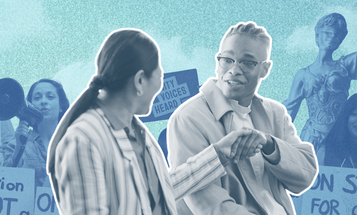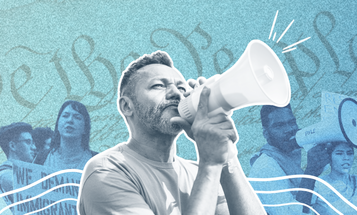
Tax Day is Essential to Democracy, Yet Trump Misses the Point
Much like Election Day, Tax Day is a shared expression of our democracy enacted by its participants.
The water we drink, cook with, and bathe in. The roads we walk, bike, and drive on. The food our kids eat at school and our struggling neighbors can put on their tables. The retirement security our elders rely on and the income insurance our unemployed workers can count on. The schools and training programs our children, young adults, and displaced workers attend. The diplomats, intelligence officers, and military personnel responsible for promoting our relationships with other nations.
Our taxes enable us to achieve together what we would never be able to do individually.
Much like voting, taxes are a particularly important civic duty – and democratic ritual – in the United States. In 1765, delegates of the American colonies drafted the Declaration of Rights and Grievances, which labeled the direct taxation of colonists – who were unable to participate in British governance – as “taxation without representation.” As the Declaration of Independence would bear out, the protest was because the Crown demanded the resources of the American demos* while neither permitting them an equal voice nor investing in the needs of those people.
In fact, The Boston Tea Party was a protest against both taxation without representation and a corporate tax giveaway; it was a direct response to the British Tea Act which lowered the cost on importing tea, while colonists still had to pay a tax to buy the tea.
Much like this example from 1773, we find that CEOs and corporations today use loopholes and high-priced accountants to avoid paying taxes. According to the US Government Accountability Office’s 2016 report, roughly one-fifth of large profitable US corporations paid no income taxes. And, in 2015, 27 of the S&P 500 corporations got a tax refund.
Even President Trump himself bragged that paying no taxes meant he was smart. And, now he wants to give billionaires and millionaires – like his cabinet members – more tax cuts so the richest among us can shirk their responsibility to care, educate, feed, and invest in our country and people.
Together, Trump’s tax agenda and budget proposal clearly demonstrates his phony populism. Even as he is considering a tax overhaul to primarily benefit the one percent and shift the burden on to the rest of us, he is proposing devastating cuts to the very parts of the government that support poor and working people. (Check out the Washington Post’s budget graphics.)
The Trump budget threatens a cut of nearly one-third of the budget of the Environmental Protection Agency – charged with protecting the quality of our air, land, and water. While we all need the science-driven regulations set by the EPA to protect our shared environment and help stem climate change, communities without the power and clout to protect themselves from corporate polluters will be disproportionately harmed by the roll back of the EPA’s resources.
The Departments of Agriculture, Labor, and Health and Human Services each face a loss of nearly one-fifth of their budgets. The USDA inspects the safety of food producers, works with small farmers starting up, and ensures that low-income students and other people have access to healthy food. The Department of Labor protects working people from dangerous, abusive, and deadly conditions on the job. Health and Human Services ensures that older and/or poor people have access to quality healthcare, ensures that food and drugs are safe, conducts medical and healthcare research, and provides direct cash assistance to the neediest.
Supreme Court Justice Oliver Wendell Holmes once said, “Taxes are what we pay for a civilized society,” and the budget is how we choose to create it. Trump’s policies would dramatically diminish our ability to achieve a better society together. Instead, his vision is for a country where tax cuts to the wealthiest Americans and to corporations come at the expense of working families.
On April 15, in cities across the country, people will march together for a different vision – a vision of a government that is responsive to its people and transparent; that taxes us equitably, demanding the fair share of corporations as well as individuals; and that puts those taxes to work promoting the well-being of us all. It is not a new idea. Although it is newly inflected, it is the foundational vision of our shared country.
Note:
* Clearly, the working definition of the American demos for the people drafting these declarations and other founding documents of the nascent nation was dramatically exclusive. Thanks to the struggles and battles over the history of the country, we have broadened the definition significantly.



